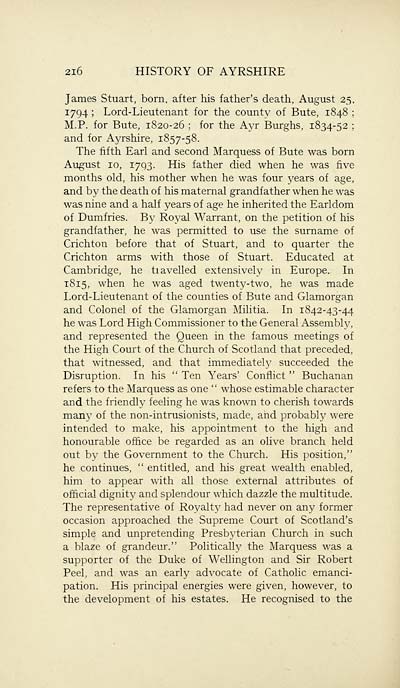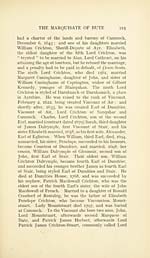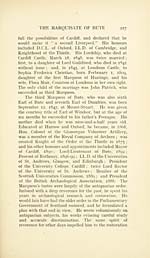Download files
Complete book:
Individual page:
Thumbnail gallery: Grid view | List view

216 HISTORY OF AYRSHIRE
James Stuart, born, after his father's death, August 25,
1794 ; Lord-Lieutenant for the county of Bute, 1848 ;
M.P. for Bute, 1820-26 ; for the Ayr Burghs, 1834-52 ;
and for Ayrshire, 1857-58.
The fifth Earl and second Marquess of Bute was born
August 10, 1793. His father died when he was five
months old, his mother when he was four years of age,
and by the death of his maternal grandfather when he was
was nine and a half years of age he inherited the Earldom
of Dumfries. By Royal Warrant, on the petition of his
grandfather, he was permitted to use the surname of
Crichton before that of Stuart, and to quarter the
Crichton arms with those of Stuart. Educated at
Cambridge, he tiavelled extensively in Europe. In
1815, when he was aged twenty-two, he was made
Lord-Lieutenant of the counties of Bute and Glamorgan
and Colonel of the Glamorgan Militia. In 1842-43-44
he was Lord High Commissioner to the General Assembly,
and represented the Queen in the famous meetings of
the High Court of the Church of Scotland that preceded,
that witnessed, and that immediately succeeded the
Disruption. In his " Ten Years' Conflict " Buchanan
refers to the Marquess as one " whose estimable character
and the friendly feeling he was known to cherish towards
many of the non-intrusionists, made, and probably were
intended to make, his appointment to the high and
honourable office be regarded as an olive branch held
out by the Government to the Church. His position,"
he continues, " entitled, and his great wealth enabled,
him to appear with all those external attributes of
official dignity and splendour which dazzle the multitude.
The representative of Royalty had never on any former
occasion approached the Supreme Court of Scotland's
simple and unpretending Presbyterian Church in such
a blaze of grandeur." Politically the Marquess was a
supporter of the Duke of Wellington and Sir Robert
Peel, and was an early advocate of Catholic emanci-
pation. His principal energies were given, however, to
the development of his estates. He recognised to the
James Stuart, born, after his father's death, August 25,
1794 ; Lord-Lieutenant for the county of Bute, 1848 ;
M.P. for Bute, 1820-26 ; for the Ayr Burghs, 1834-52 ;
and for Ayrshire, 1857-58.
The fifth Earl and second Marquess of Bute was born
August 10, 1793. His father died when he was five
months old, his mother when he was four years of age,
and by the death of his maternal grandfather when he was
was nine and a half years of age he inherited the Earldom
of Dumfries. By Royal Warrant, on the petition of his
grandfather, he was permitted to use the surname of
Crichton before that of Stuart, and to quarter the
Crichton arms with those of Stuart. Educated at
Cambridge, he tiavelled extensively in Europe. In
1815, when he was aged twenty-two, he was made
Lord-Lieutenant of the counties of Bute and Glamorgan
and Colonel of the Glamorgan Militia. In 1842-43-44
he was Lord High Commissioner to the General Assembly,
and represented the Queen in the famous meetings of
the High Court of the Church of Scotland that preceded,
that witnessed, and that immediately succeeded the
Disruption. In his " Ten Years' Conflict " Buchanan
refers to the Marquess as one " whose estimable character
and the friendly feeling he was known to cherish towards
many of the non-intrusionists, made, and probably were
intended to make, his appointment to the high and
honourable office be regarded as an olive branch held
out by the Government to the Church. His position,"
he continues, " entitled, and his great wealth enabled,
him to appear with all those external attributes of
official dignity and splendour which dazzle the multitude.
The representative of Royalty had never on any former
occasion approached the Supreme Court of Scotland's
simple and unpretending Presbyterian Church in such
a blaze of grandeur." Politically the Marquess was a
supporter of the Duke of Wellington and Sir Robert
Peel, and was an early advocate of Catholic emanci-
pation. His principal energies were given, however, to
the development of his estates. He recognised to the
Set display mode to:
![]() Universal Viewer |
Universal Viewer | ![]() Mirador |
Large image | Transcription
Mirador |
Large image | Transcription
Images and transcriptions on this page, including medium image downloads, may be used under the Creative Commons Attribution 4.0 International Licence unless otherwise stated. ![]()
| Histories of Scottish families > Ayrshire > Volume 2 > (226) Page 216 |
|---|
| Permanent URL | https://digital.nls.uk/95191810 |
|---|
| Attribution and copyright: |
|
|---|---|
| Description | A selection of almost 400 printed items relating to the history of Scottish families, mostly dating from the 19th and early 20th centuries. Includes memoirs, genealogies and clan histories, with a few produced by emigrant families. The earliest family history goes back to AD 916. |
|---|

